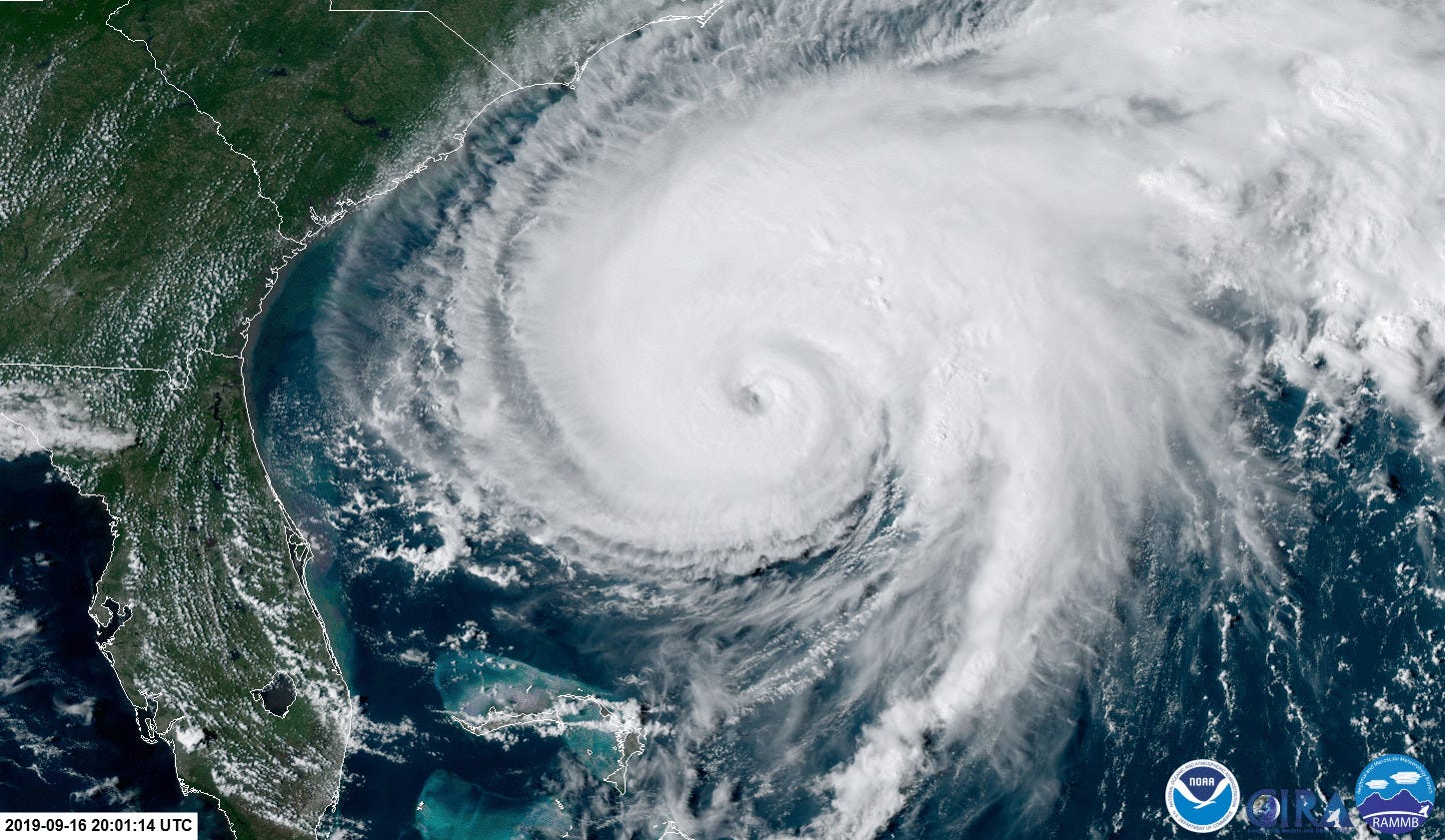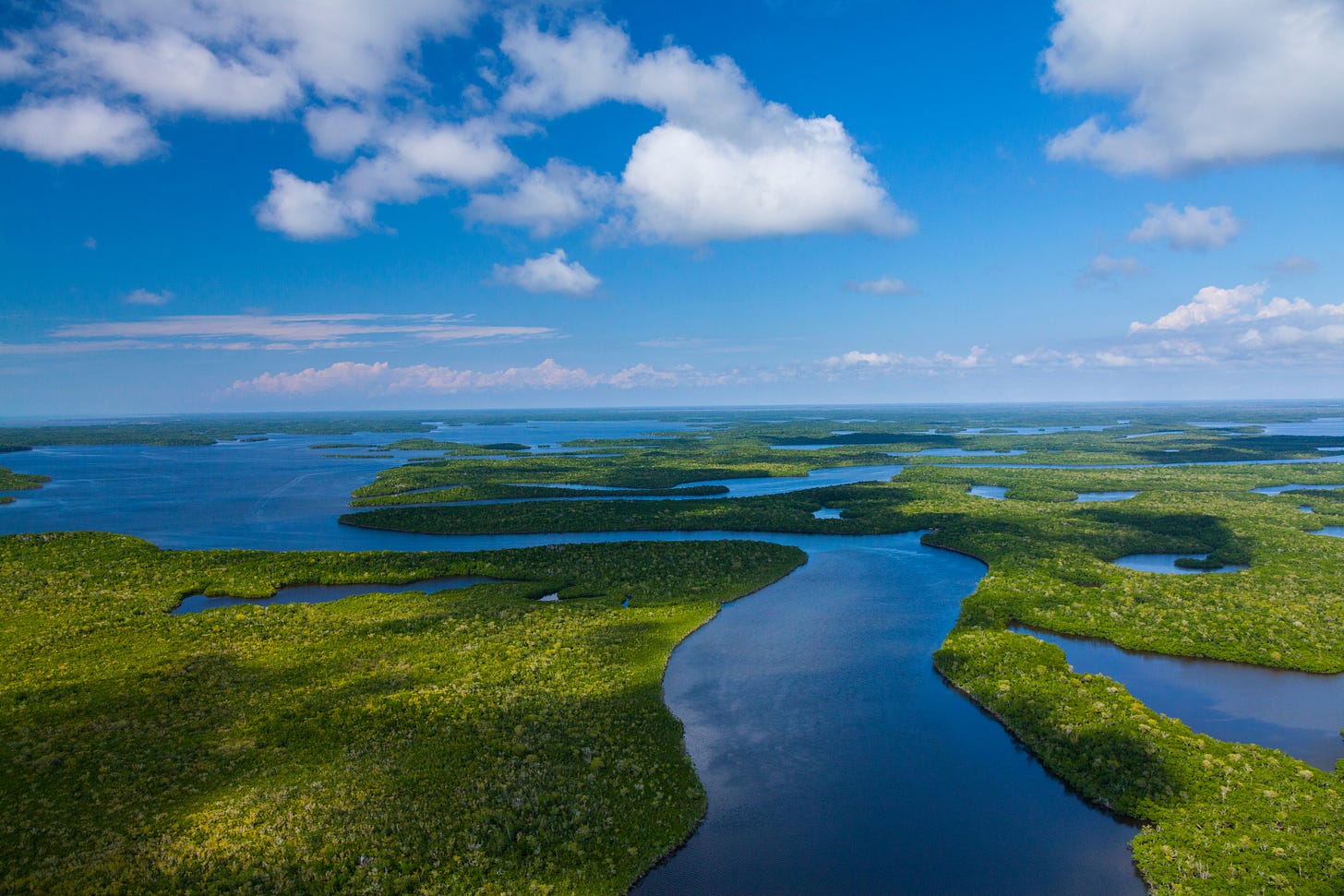In month of historic pivot points, clean energy at crossroads
Welcome to Callaway Climate Insights, your guide to global climate finance. Please enjoy and share with your colleagues.
Today’s edition of Callaway Climate Insights is free for all our readers. We really want to bring you the best and latest in climate finance from around the world. Please subscribe now.
The Atlantic hurricane season starts June 1, and it is poised to be a turbulent year with AccuWeather predicting 13 to 18 storms and warning of hurricanes that can rapidly strengthen leading up to landfall. In the 2024 season, there were 11 hurricanes.
As the stock market closes out a frustrating March amid talk of bursting AI bubbles and tariff scares, it’s worth pointing out the historical importance of the month of March to modern markets.
This March, in fact this week, marks the 25th anniversary of the dot-com bubble, which exploded in 2000 after five years that saw the S&P 500 triple and the Nasdaq increase eight-fold — to levels they would not see again for almost seven years. I can remember all too vividly sitting in my office at CBS MarketWatch, one of the dot-com success stories, wondering if the decline would last more than three months.
Nine years later, in early March of 2009, I remember equally wondering if the collapse in equities that started in 2007 during the subprime debt crisis (and extended all the way through the failure of Lehman Brothers in the autumn of 2008) was just the beginning of what was already a brutal bear market. That time, it actually ended on March 9, beginning a bull run in the markets that, except for a few blow ups such as Covid in 2020, has continued to this day.
Nobody can predict the markets. Each of the collapses of the past 25 years carried their own characteristics, from lack of revenue and profits in the dot-coms to shaky mortgage derivatives in the Great Financial Crisis of 2008.
But some months, such as September, October, May, and indeed, March, can be more important than others. As the U.S. stock market finishes this week, likely lower for the month, we all ask the same question. Is this the beginning of a Trump-induced implosion and bursting AI bubble, or simply another correction that will right itself in a short time?
For climate investors, two news items this week should stand out. One, a new study by Boston Consulting Group said that the destruction of the climate agenda taking place under President Donald Trump will lead to a 34% decline in global economic output this century. That’s a bear case if I ever heard it.
Second, renewable energy is soaring, having accounted for 90% of new energy capacity in 2024, according to the International Renewable Energy Agency. Private equity and other large investors are eyeing up renewable assets after their stocks have fallen, seeing a potential cheap way into what could be a powerful market rally at some point. That’s a bullish case.
In my 40 years of watching the stock market, the only thing I know for sure is that the Dow Jones Industrial Average surpassed 2000 in 1986 and now stands above 42,000 — despite all the crises. March seems to be a good time to worry about change in short-term direction, but April is just around the corner.
Don’t forget to contact me directly if you have suggestions or ideas at dcallaway@callawayclimateinsights.com.
Follow us . . . .
Twitter | LinkedIn | Facebook | Instagram
Trump administration takes a swing at Chinese golf carts
. . . . The vast amount of tariffs being implemented or considered by the Trump administration have finally caught up to the Chinese electric golf cart industry, which has quietly made the U.S. its largest market with slick new carts and accessories for golfers and retirement communities, writes Bill Sternberg. While the protectionist Trump will help save some jobs in places such as Augusta, Ga., home to many golf cart workers as well as the famed Masters Tournament, it will mean higher prices going forward to golf cart enthusiasts, especially if they want those hot Chinese models such as the Evolutions, which in total accounted for almost $1 billion in Chinese export sales to the U.S. in 2023.
Thursday’s subscriber insights
BlackRock joins European push to redefine ESG funds
. . . . A European push to redefine how fund companies market products with sustainable or ESG in their names has caught up with BlackRock BLK 0.00%↑ , but conveniently at just about the perfect time politically.
Regulators in Europe last year passed a new rule that any funds using sustainable or ESG wording in the names of their funds must have at least 50% of the assets in those funds in companies or entities that are indeed working on sustainable issues. More than 6,000 European funds are expected to have to change the names, and in some cases investment strategies, of their products, according to Bloomberg.
BlackRock itself will have to change the names or strategies of about 135 funds, it told investors this week. The changes could cause some shifting of assets as investors who want to be in sustainable funds move into products more suited for them. But for the firm itself, the timing of the changes couldn’t be more convenient.
The war on ESG and the Trump administration’s hostility to climate regulations and companies that support sustainable investing has been hard on BlackRock, whose founder Larry Fink was once a champion of climate risk investing. The firm has steadily moved away from its sustainable campaign as large pension clients in red states have balked.
Changing the names of the funds will simply fit into a broader new marketing strategy that is more tied to energy ambition and security and less to ESG. Once clean energy stocks start to make a comeback, they will undoubtedly appear in BlackRock portfolios, just under a different name or strategy.
Editor’s picks: Get packin’!; plus, private equity focuses on renewables
How to pick the perfect campsite
It’s time to plan the perfect summer camping trip. Step 1: Pick the perfect campsite. Step 2: Plan like a pro. How to do Step 1 and Step 2? Check out Your Complete Guide to Camping in 2025, from Recreation.gov. That’s the centralized travel planning platform and reservation system for 14 federal agencies, offering the tools, tips, and information needed for you to discover destinations and activities, plan a trip, and explore outdoor and cultural destinations in your zip code and across the country. Demand for camping in national parks and other federal recreation areas often far exceeds the limited supply of campsites, especially during peak seasons. You can use Recreation.gov to find the perfect campground for your summer vacation, make reservations and even find out all about the area. Plus, there’s information on all the wildlife, from bugs to bears.
Private equity shifts focus to renewables
Private equity investment in fossil fuel companies increased 131% year over year to $15.31 billion in 2024, according to S&P Global Market Intelligence data. In a report headlined Private equity shifts focus to fossil fuels from renewables, S&P analysts say deal value for renewables rose about 64% to $25.91 billion. “The momentum for the sector was strong over the past two quarters of 2024, when private equity investment in oil and gas companies reached $10.17 billion, surpassing the $5.14 billion of private capital inflow to renewables companies.” The report notes the asset selloff by large oil and gas companies is driving private equity acquisitions in both fossil fuels and renewables, citing Hargreaves Lansdown PLC ESG analysis.
Latest findings: New research, studies and projects

Hotter summers in Europe worsen health problems
Climate change is bringing abnormally high temperatures to Europe and thus a substantial physical and mental health burden, especially for older populations, say the authors of this research paper titled Heat and Well-Being in the Old Continent from the Ca' Foscari University of Venice, Department of Economics. They estimate that 10 extra days in a year at 31ºC (87.8°F) — an increase predicted for many European regions, without air conditioning — increases the probability of health effects such as serious fatigue, reduced appetite, difficulty sleeping and even hospitalization. From the abstract: “We find that the effects of heat and AC's protection accrue over time. The evidence of significant residual impacts calls for research on alternative adaptation measures.” Authors: Catarina Midões, Ca Foscari University of Venice; Autonomous University of Barcelona; Enrica De Cian, Fondazione Eni Enrico Mattei (FEEM); CMCC - Centro Euro-Mediterraneo sui Cambiamenti Climatici.
More of the latest research:
Creditworthy: Do Climate Change Risks Matter for Sovereign Credit Ratings?
Climate Resilience Planning and the Tennessee Valley Authority
Words to live by . . . .
“I believe that life should be lived so vividly and so intensely that thoughts of another life, or of a longer life, are not necessary.” — Marjory Stoneman Douglas, whose outspoken activism helped preserve Everglades National Park, Big Cypress Preserve and Biscayne National Park.







Thanks. See you in a few weeks.
Great column today!